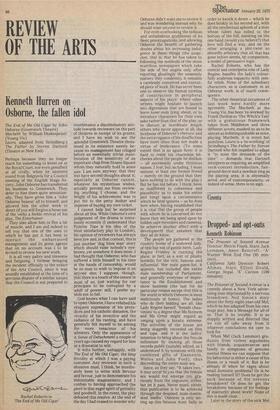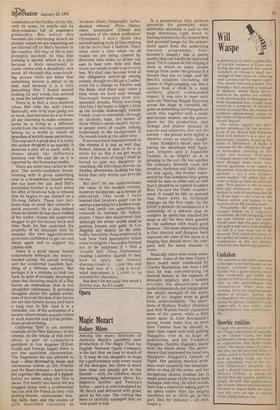Droppedand opt-outs
Kenneth Robinson
• .
The Prisoner of Second Avenue Director: Melvin Frank. Stars: Jack Lemmon, Anne Bancroft. 'A' Warner West End One (95 minutes)..
California Split Director: Robert Altman. Stars: Elliott Gould, George Segal. 'X' Curzon (109 minutes).
The Prisoner of Second Avenue is a comedy about a New York advertising man imprisoned by a nervous breakdown. Neil Simon's story about the forty-eight-year-old Mel, which he has adapted from his own stage play, has a Message for all of us. That is its trouble. It is so sloppily written and directed that we can all take away from it whatever conclusions we care to look for.
When Mel (Jack Lemrnon) graduates from violent arguments with friends, acquaintances and family to symptoms of genuine mental illness we can suppose that his behaviour is either a cause of his illness or a result of it. But is he already ill when he rages about small domestic problems? Or is he making himself ill? Does he get the sack because of his nervous breakdown? Or does he get the breakdown because of his feelings of insecurity about work? None of this is made clear.
Later in the story of the sick Mel
comments on the futility of city life, with its noise, its smells and its shop-windows full of expensive gimmickry. But before this becomes the convincing attack on phoney values we are expecting we are hurried off to Mel's brother in the country. His way of life is also promptly mocked. In this film nothing is sacred, which is a pity because it deals relentlessly in comic terms with a dreadfully sick mind. All through this wise-cracking picture there are hints that something serious is about to be said. And because it is a very disturbing film I found myself looking for any words that seemed to treat the subject with respect.
There is, in fact, a nice moment when Mel tells his wife (Anne Bancroft), who is by now going out to work, that because he is at home all day listening to radio commentaries he is living in a different world from the one the commuters belong to; a world in which all branches of society seem pernicious. This was such a good idea it is a pity the author dropped it so quickly. It deserves a play all to itself, with a theme about the difference between real life and life as it is reported by the hysterical media.
There are some nice twists in the plot. The newly-confident breadwinning wife is given something near to a breakdown herself when she too loses her job. And Mel's successful brother is so hurt when his offer of financial help is refused that he begins to see himself as a life-long failure. These two incidents help to push Mel towards a quick recovery. He is also helped when he thinks he has been robbed of his wallet, chases the suspected mugger to get his money back and later finds he has snatched the property of an innocent man by mistake. His own aggressiveness gives him confidence to get out and about again and to support his jobless wife.
There is a good theme buried somewhere beneath the heavyhanded acting, the unruly writing and the occasional tasteless handling of a delicate subject. But perhaps it is a mistake to look too hard. In spite of its badly-developed ideas this shouting-match of a film leaves an impression that is not altogether unpleasant. It provokes thoughts about the added awfulness of love on the dole if the lovers are are also luxury-lovers and have a long way to fall. And it is a reminder, too, of the awfulness of a society where people acquire riches in such insecure and trivial professions as advertising.
California Split is yet another example of the New Illiteracy in the cinema. In the whole of this story about a pair of compulsive gamblers in Los Angeles (Elliott Gould and George Segal) there is not one sustained conversation. The fragments we are allowed to hear — often drowned by music and extraneous noises in the Freebie and the Bean manner — have to be put together like pieces of a jigsaw before we know what the film is about. For nearly two hours we are dragged along with a professional opt-out and his friend as they visit gaming-houses, racecourses, boxing halls, bars and the rooms of girls described variously as 'hookers' (Daily Telegraph); 'lackadaisical whores' (New Statesman), 'prostitutes' (Times) and 'members of the oldest profession' (Synopsis). I don't think this eavesdropping style of film-making can be more than a fashion. There must come a time when we all realise we are being conned by directors who make us strain our ears to hear very little and then, strain our minds to add it up to even less. We shall also become tired of the obligatory punch-up among urinals, though we did get a Ladies' room for a change in Freebie and the Bean. And there may come a time when we have seen enough film-length horse-play from irresponsible drunks. While watching this film I did begin to fidget a little as the lovable endearingly loutish friends tried to remember, through an alcoholic haze, the names of Snow White's seven dwarfs. Several people were, of course, talking irrelevantly in the background of the sound-track at the same time.
If we must have Impressionism in the cinema it is just as well that Robert Altman is able to do it so nicely for us. But if we get much more of this sort of thing I shall be forced to join my daughter in watching old television movies on Sunday afternoons, looking for the kicks that only words can provide for me.
But don't let me underestimate the value of the modern cinema, however incoherent, as a means of education. This week I have learned that lavatory-paper can be used as a packing for a broken nose, and that teeth can sometimes be removed in mistake for kidney stones. I have also discovered that although the swear words used in gaming houses and pubs in Los Angeles are mostly to do with bodily functions, those employed in lush New York apartments relate more to religion. I have also learned not to be surprised if I find a 'lovable tart' (New Statesman) reading Laurence Durrell in bed; how to apply hot instant shaving-cream to -uised ribs, and the best way of h ding a woodwind instrument if I want to be arrested for obscenity. But don't let me spoil this week's film for you. As if I could.
Opera



























 Previous page
Previous page